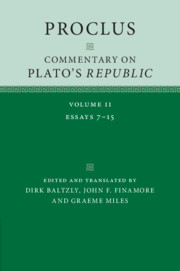Book contents
- Proclus
- Proclus
- Copyright page
- Dedication
- Contents
- Acknowledgements
- Note on the Text and Translation
- General Introduction
- On the Republic of Plato: Essays 7–15
- Introduction to Essay 7
- Essay 7 Proclus the Successor on the demonstrations in the fourth book of the Republic on the three parts of the human soul and the virtues that are 5 in them.
- Introduction to Essays 8 and 9
- Essay 8 236 Concerning the arguments in the fifth book of the Republic showing the virtues and education of men and women to be the same.
- Essay 9 251 An examination of the arguments of Theodore of Asine that render virtue the same for men and women and concerning what 5 Socrates said.
- Introduction to Essay 10
- Essay 10 258 On the discussion in the Fifth Book of the Republic demonstrating what kind the love of 5 learning of philosophers is, and what kind that of the majority.
- Introduction to Essay 11
- Essay 11 269On the Discussion in the Republic Demonstrating What the Good Is
- Introduction to Essay 12
- Essay 12 287On the Cave in the Seventh Book of Republic
- Introduction to Essay 13
- Essay 13 1 By Proclus the Lycian, Diadochus of the Platonic School
- Introduction to Essays 14 and 15
- Essay 14 81 On the Three Arguments Showing that the Just Life is Happier than the Unjust
- Essay 15 84The major sections of the Tenth Book
- References
- English–Greek Glossary
- Greek Word Index
- General Index
Introduction to Essay 11
from On the Republic of Plato: Essays 7–15
Published online by Cambridge University Press: 23 June 2022
- Proclus
- Proclus
- Copyright page
- Dedication
- Contents
- Acknowledgements
- Note on the Text and Translation
- General Introduction
- On the Republic of Plato: Essays 7–15
- Introduction to Essay 7
- Essay 7 Proclus the Successor on the demonstrations in the fourth book of the Republic on the three parts of the human soul and the virtues that are 5 in them.
- Introduction to Essays 8 and 9
- Essay 8 236 Concerning the arguments in the fifth book of the Republic showing the virtues and education of men and women to be the same.
- Essay 9 251 An examination of the arguments of Theodore of Asine that render virtue the same for men and women and concerning what 5 Socrates said.
- Introduction to Essay 10
- Essay 10 258 On the discussion in the Fifth Book of the Republic demonstrating what kind the love of 5 learning of philosophers is, and what kind that of the majority.
- Introduction to Essay 11
- Essay 11 269On the Discussion in the Republic Demonstrating What the Good Is
- Introduction to Essay 12
- Essay 12 287On the Cave in the Seventh Book of Republic
- Introduction to Essay 13
- Essay 13 1 By Proclus the Lycian, Diadochus of the Platonic School
- Introduction to Essays 14 and 15
- Essay 14 81 On the Three Arguments Showing that the Just Life is Happier than the Unjust
- Essay 15 84The major sections of the Tenth Book
- References
- English–Greek Glossary
- Greek Word Index
- General Index
Summary
In Essay 11 Proclus discusses one of the most memorable sections of the Republic: the analogy between the Sun and the Good. His response to this challenging portion of the text is conceptually rich and subtle. The essay builds on the definitions developed in Essay 10 to explore the sense in which the Good can be understood when it is fundamentally unlike other objects of understanding. Essay 11 is also, by its nature, related to Essay 12, on the Cave and the Divided Line. Essay 12, however, makes a fresh start and is pitched in general at a more introductory level, as an overview of Platonic education as a whole.
The first step in Proclus’ discussion is establishing three different senses of ‘the good’ (to agathon) in Plato’s teaching on the subject. The first of these is ‘the good in us’ (to en hêmin agathon (269.16)), which is neither pleasure nor intellect, and with which he says that Socrates begins in the present passage of the Republic.
- Type
- Chapter
- Information
- Proclus: Commentary on Plato's 'Republic' , pp. 140 - 148Publisher: Cambridge University PressPrint publication year: 2022

